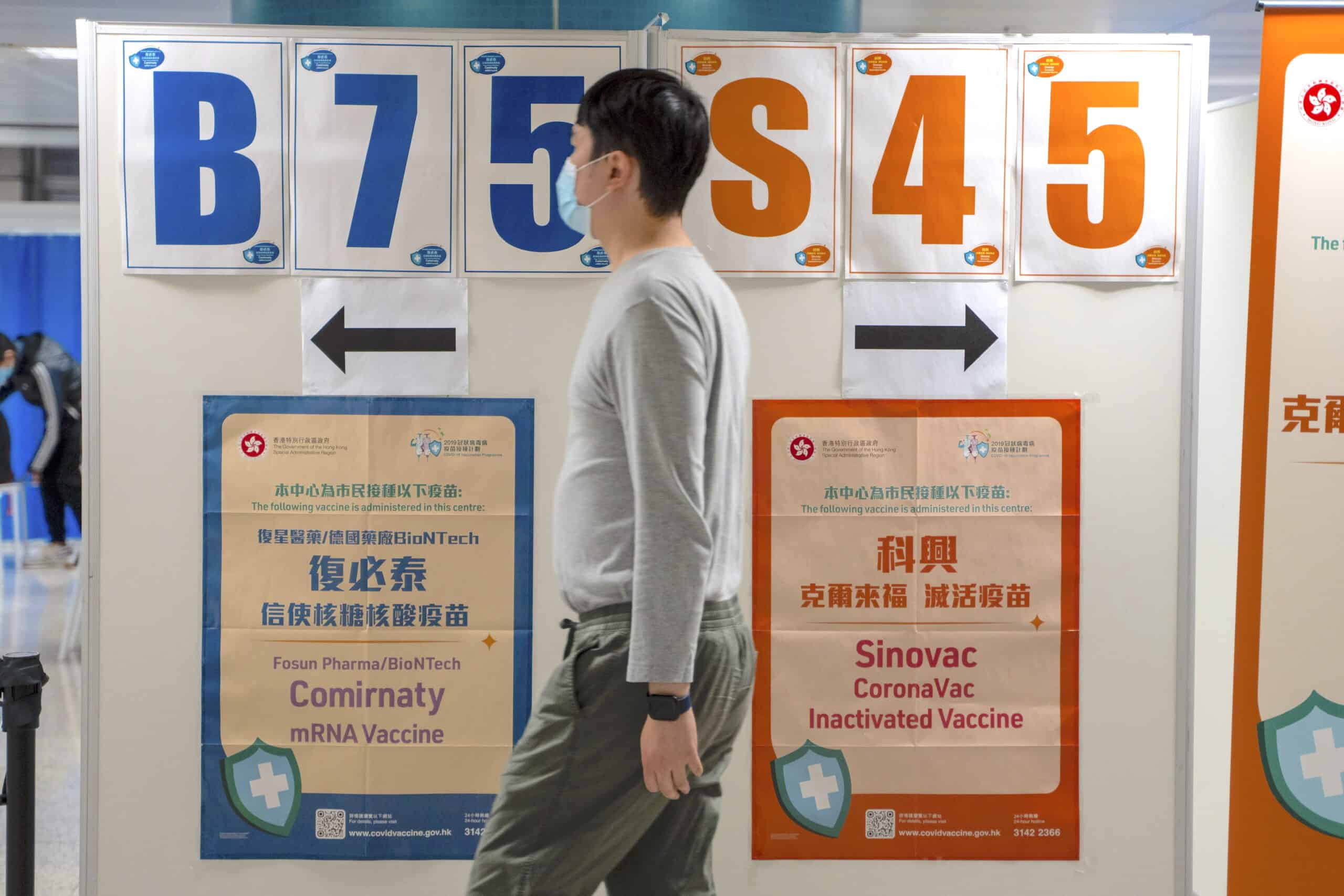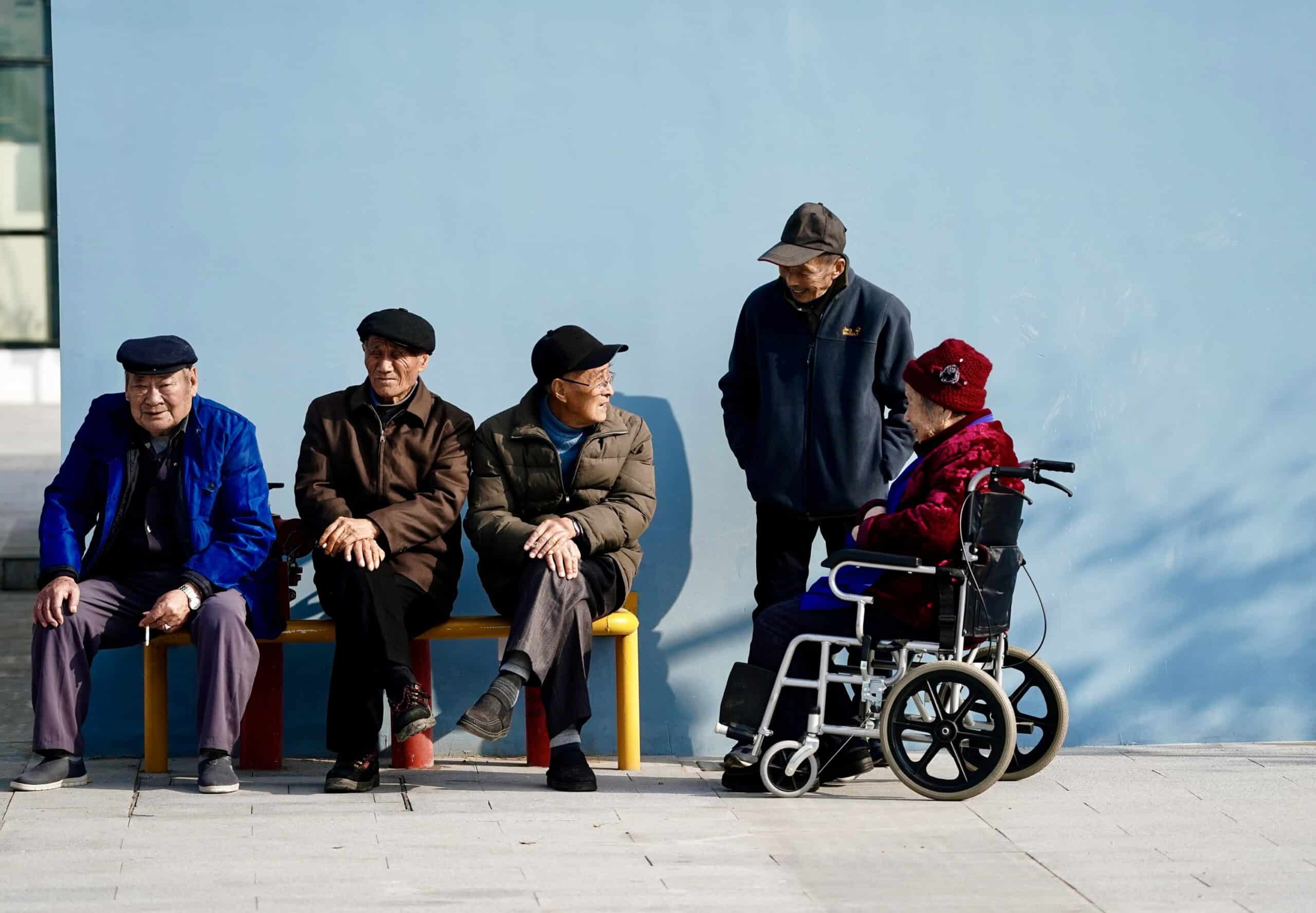
After three years of COVID isolation, mainland Chinese residents are finally able to go abroad without having to quarantine when they get home. Many are using their first stops outside mainland borders to get injected with vaccines long available in much of the outside world.
Clinics in Hong Kong, which opened its borders for quarantine-free travel on Jan. 8, say they are at full capacity serving mainland tourists with mRNA booster shots produced by Germany’s BioNTech. The Hong Kong branch of China Citic Bank International, a Chinese state-owned bank, is even offering free mRNA COVID jabs for mainland Chinese customers if they deposit enough funds in the bank. In Macau, where mRNA boosters are also available, Chinese tourists have overwhelmed local hospitals and private clinics with vaccine appointments.
The rush for jabs is a direct result of mainland China remaining the world’s only major economy yet to approve mRNA vaccines, even though they offer better and longer lasting protection against COVID than the country’s homegrown versions. For its vaccination campaign, mainland China has largely relied on shots that introduce a killed or inactivated form of the virus into the body to stimulate an immune response; mRNA vaccines, by contrast, use genetic code to teach the body to make a virus-fighting protein.
Beijing’s reticence to approve foreign-made mRNA vaccines — borne of a combination of political hubris, commercial protectionism, and national pride — has left China’s masses without access to the world’s most effective vaccines, even as COVID now wreaks havoc across the country.
People are now concluding that they can’t rely on the government to protect them the way they thought they could.
Susan Shirk, Professor at UCSD
Since Beijing started dropping its harsh lockdown strategies in mid-December, the virus has spread rapidly. Patients have been crowding into understaffed hospitals, sometimes receiving treatment from infected medical staff. Nearly 73,000 people died from the virus from Dec. 8 to Jan 19. according to the Chinese government, and desperate relatives are having to wait in hours-long lines at funeral homes and crematoriums to dispose of loved ones.
“China’s government was not doing what it needed to protect people through vaccines,” says Susan Shirk, a Chinese politics professor at the University of California San Diego. “People are now concluding that they can’t rely on the government to protect them the way they thought they could.”
VACCINE NATIONALISM
Such outcomes would have seemed unlikely back on Feb. 29, 2020, when Dr. Chen Wei, a virologist and major general in the People’s Liberation Army, became one of the world’s first people to receive a COVID vaccine, injecting herself with a Chinese-made shot on national television. Dr. Chen’s act helped set the tone for a vaccine strategy that aimed both to halt the spread of the deadly virus, and to burnish China’s credentials as a global leader in countering COVID.
“China wanted to change the narrative from China being the origin of this pandemic, into China being the savior of the pandemic,” says Chunhuei Chi, a global health policy professor at Oregon State University. “They couldn’t accept or open up for any foreign vaccines because it was about saving face.”
Zhao Lijian retweeted this tweet from CGTN host, Liu Xin.
In January 2021, just as U.S. companies Pfizer and Moderna began the global rollouts of their vaccines, China’s government was sowing doubts about the safety and efficacy of mRNA jabs. The People’s Daily, a mouthpiece for China’s government, called the U.S. government’s promotion of Pfizer’s vaccine a “process of large-scale testing on human beings.” Zhao Lijian, then China’s foreign ministry spokesperson, reshared an unverified report of 10 deaths in Germany resulting from Pfizer’s vaccine.
“Chinese state media promoted the idea that mRNA vaccines were a tool that the West was using against the Chinese population. It was just misinformation,” says Adam Chen, a health policy professor at the University of Georgia.
China’s government, meanwhile, promoted its own, inactivated jabs as a safer alternative. Its conservative approach was in part dictated by a recent history of vaccine scandals which have plagued China’s pharmaceutical industry, meaning Beijing was likely more wary than countries such as the U.S. or U.K. in betting on a new vaccine platform.
“It made sense for China to try to pursue its own path,” says Frederick Abbott, an international pharmaceutical law professor at Florida State University. “Up until COVID-19, no one had ever introduced an effective mRNA vaccine. So it was an unproven technology.”
An unfortunate legacy of undermining mRNA vaccines to promote its own jabs is that even if Beijing approves such vaccines in future, it may find it difficult to convince people they are safe.
“The negative sentiments China promoted about mRNA, especially at the very beginning, are very difficult to change. People say, ‘you know, just to protect myself, I better not to take it.’” Dr. Jennifer Bouey, an epidemiologist at the Rand Corporation.
STARTS AND STOPS
At one point, a foreign-made vaccine appeared close to breaking through the Chinese government’s anti-mRNA rhetoric. Before Germany’s BioNTech developed a successful vaccine candidate, it agreed in March 2020 to give Fosun Pharma — a Chinese firm — the exclusive sales and distribution rights for its future COVID-19 mRNA vaccine in mainland China, Taiwan, Hong Kong, and Macau.

The Fosun-BioNTech pairing appeared to perfectly suit the Chinese market. BioNTech and Fosun could skirt Beijing’s preference for a homemade jab and distribute the vaccine as a Chinese-branded product, and Fosun even allotted manufacturing facilities to make the drug in China. But mainland Chinese regulators never approved the vaccine for widespread domestic use, even after Fosun began distributing it in Hong Kong, Macau, Taiwan, and to German expats in mainland China.
Beijing’s failure to approve the Fosun-BioNTech drug remains a mystery, even to close observers.
“It’s simply puzzling why BioNTech and Fosun haven’t reached an agreement with the Chinese government,” says Abbott. BioNTech and Fosun Pharma did not respond to The Wire China’s request for comment. “My assumption is that several Chinese companies were claiming to be on the cusp of developing their own effective mRNA vaccines… and China has a strong preference for having their own indigenous vaccine.”
Some domestic companies have since appeared close to developing a Chinese-made mRNA COVID jab, but no homegrown candidates have yet to hit the market.
LAUNCHPAD TO LAGGARD
Intellectual property rights have emerged as the latest roadblock in getting foreign-made mRNA vaccines to China.
Last September, Stephane Bancel, the chief executive of Moderna, surprised investors when he said his company was “open to” supplying China with vaccines. But in later negotiations, Chinese regulators demanded that Moderna, which is based in Cambridge, Mass., hand over its vaccine recipe to a domestic drugmaker as a condition to entering the market. Moderna rejected that stipulation, saying it could not conduct proper oversight of its vaccines if it handed over the intellectual property to a Chinese partner, according to the Financial Times. Moderna did not not respond to The Wire’s request for comment on the firm’s negotiations with the Chinese government.
The COVID-19 pandemic provided an opportunity for China to expand as a technological powerhouse in developing a successful anti-COVID vaccine. They suffered a setback.
Yanzhong Huang, from the Council on Foreign Relations.
“mRNA is a completely new and innovative technology. There’s never been a vaccine in the history of the world that’s used that technology until this one so companies are more zealous in keeping their trade secrets,” says Lawrence O. Gostin, a global health law professor at Georgetown University.
China’s mRNA blockade likely has costs beyond immediate public health impacts. Three years ago, China had high hopes that the pandemic could be a launchpad for its domestic pharmaceutical industry. Instead, Beijing has blocked the country’s population from accessing the latest advancement in biotech innovation.
“The COVID-19 pandemic provided an opportunity for China to expand as a technological powerhouse in developing a successful anti-COVID vaccine.” says Yanzhong Huang, senior fellow for global health at the Council on Foreign Relations. “They suffered a setback.”

Grady McGregor is a staff writer for The Wire China based in Washington, D.C. He was previously a staff writer at Fortune Magazine in Hong Kong, writing features on business, tech, and all things related to China. Before that, he had stints as a journalist and editor in Jordan, Lebanon, and North Dakota.



